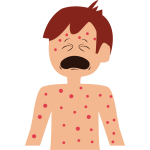In February 2024 Ireland’s Health Service Executive (HSE) Health Protection Surveillance Centre stated that it had been notified of the death of an adult with “confirmed” measles, reported from a hospital in the Dublin and Midlands Health Region. It was the first confirmed measles case notified in Ireland in 2024 as cases surge in other countries, causing concern over participation in the recommended MMR vaccination programme.
Health response
HSE states that public health teams are working with the HSE Measles National Incident Management Team (IMT) to take “all necessary public health actions” to address the case. The Measles IMT was established in response to the wider rise in cases across the UK and Europe. It is reported that 4 cases were identified in 2023, two in 2022, and none in 2021. There were no deaths recorded in recent years.
The HSE offers MMR vaccination to “all children” within the childhood immunisation schedule and offers a catch-up service for children aged 10 years or under who have missed the earlier opportunity.
An “alarming rise” for WHO Europe
In December 2023 WHO Europe warned of an “alarming rise” in measles cases, with over 30,000 cases reported by 40 of the Region’s Member States between January and October 2023.
“This represents a more than 30-fold rise. The rise in cases has accelerated in recent months, and this trend is expected to continue if urgent measures are not taken across the Region to prevent further spread.”
Dr Hans Henri P. Kluge, WHO Regional Director for Europe, was concerned not only by the increase in cases, but the “nearly 21,000 hospitalisations and 5 measles-related deaths”.
“Vaccination is the only way to protect children from this potentially dangerous disease. Urgent vaccination efforts are needed to halt transmission and prevent further spread.”
This message was echoed by Professor Dame Jenny Harries of UKHSA in January 2024 as she encouraged parents to check their children’s vaccination status to ensure they have “lifelong protection”.
How bad can it be?
WHO describes measles as a “highly contagious disease” that spreads “easily”; it can cause “severe disease, complications, and even death”. It is most common in children. However, the measles vaccine, introduced in 1963, is the “best way” to prevent severe disease and transmission. Prior to the vaccine, WHO suggests that “major epidemics” occurred approximately every two to three years”, causing “an estimated 2.6 million deaths each year”.
To join us at the Congress in Washington this April to explore childhood immunisation strategies and managing uptake in a time of mistrust, get your tickets here. Don’t forget to subscribe for more insights and updates.





